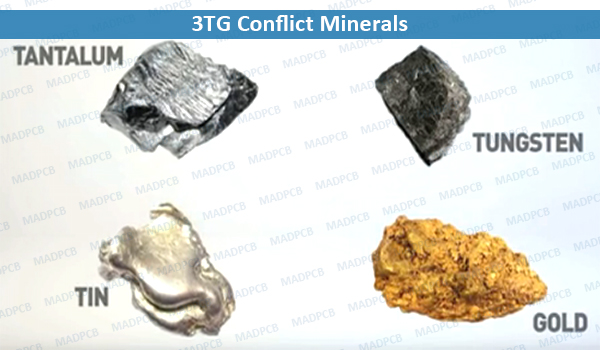What Are Conflict Minerals?
Conflict Minerals describes the complex of problems, that mining and trading in certain raw materials can help finance armed groups in Conflict Areas that are associated with serious violations of human rights, child labor and environmental pollution. The term “Conflict Minerals” is used mostly for the five raw materials, including Tin, Tantalum, Tungsten, Gold (“3TG” for short) and Cobalt.
Tin and gold are used in the printed circuit board (PCB) industry for the surface finish and SMT assembly, and cobalt (in small proportions) for connector gold / electroplated hard gold.
Important regulatory requirements for conflict minerals are currently:
- OECD Guidelines on due diligence in the supply chain.
- US Dodd Frank Act, Section 1502 for companies listed on US stock exchanges “Conflict free” for 3TG with geographical limitation.
- EU Regulation (EU) 2018/821 on due diligence global application for EU importers of affected raw materials (above quantity threshold).
MAD PCB is not directly affected by the mentioned regulations. However, these and other initiatives are still important to us. We carefully check our suppliers and also carry out regular examinations and updates. The reporting templates of the Responsible Minerals Initiative (RM) serve as the basis. MAD PCB does not knowingly use metals from conflict regions based on the information provided to us by our suppliers.
Dodd-Frank Act -Conflict Minerals
The U.S. Dodd-Frank Act to reform the U.S. conflict minerals from the Democratic Republic of Congo (and neighboring countries), and names explicitly coltan, tungsten, gold and tin, of which the latter two play a role in the production of circuit boards.
U.S. companies listed at the stock exchange are obligated by Dodd-Frank to disclose minerals originate from the DRC or neighboring countries.
Responsible Minerals Initiative
The responsible Minerals Initiative (RMI), formerly Conflict-Free Sourcing Initiative (CFSI), has become one of the most widely used and respected resources for companies dealing with responsible mineral sourcing in their supply chains.
A template can be downloaded from he RMI website that complies with the provisions of the Dodd-Frank Act and is designed to keep the supply chain manageable and free from conflict minerals. This template also includes a list of already certified smelters.
The RMI also offers itself to companies and their suppliers as an independent service provider who carries out the testing of smelters and refineries as “conflict-free”, in accordance with current global standards.
ZVEI – Position Paper
The ZVEI (German Electrical and Electronic Manufacturers’ Association), has recognized that the issue of conflict minerals intervenes deeply with the supply chain of German and European companies and thus it applies to the EU to prevent a law à la Dodd-Frank-Act.
The aim is to achieve a humanitarian solution that is viable for industry, e.g. the certificate of the smelters as a “bottleneck”. Certification extends to only a few companies and is traceable and verifiable. A chemical / geological proof of origin (fingerprint) of the raw materials is only possible before the smelting plant.
Certification of smelting companies is therefore easier to implement / verify than product -related certification across the entire supply chain and offers a significant added value as a system-safe approach.

